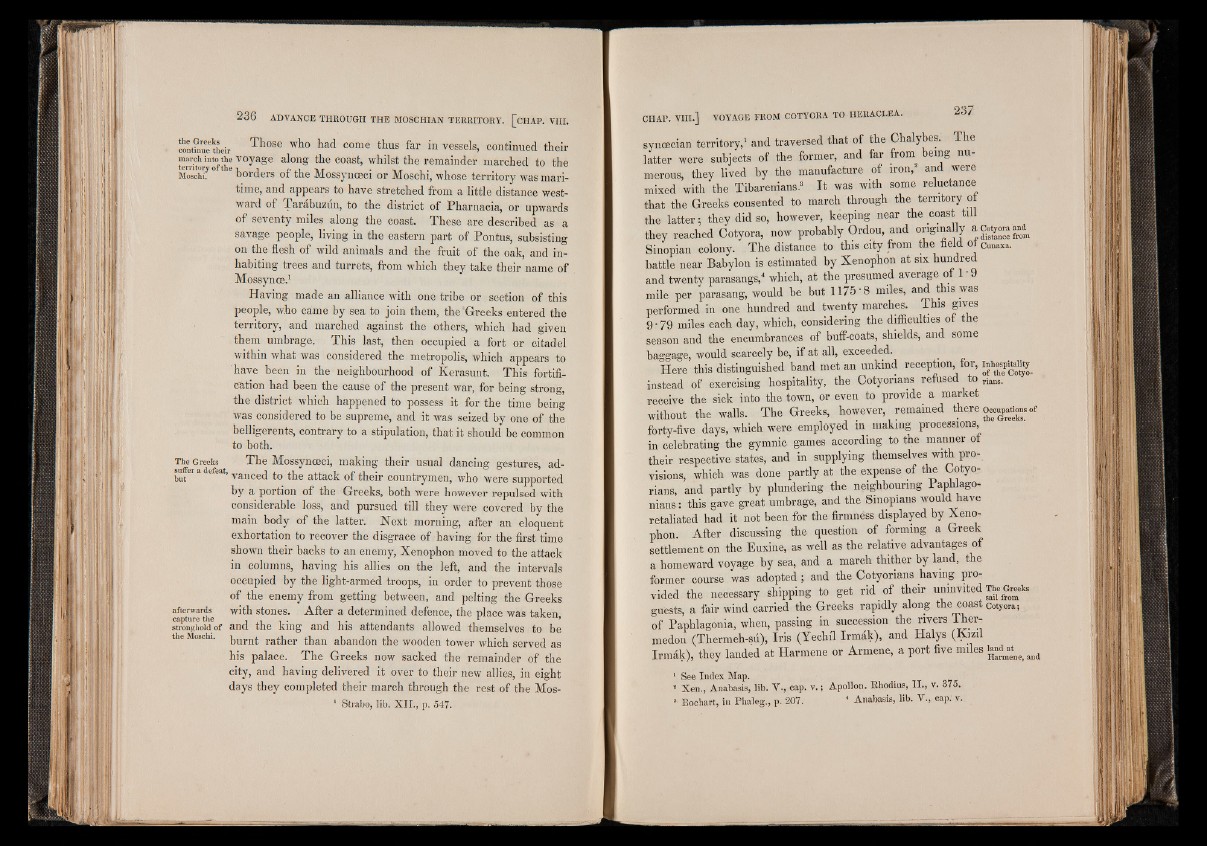
continue their Tllose who pad come thus far in vessels, continued their
territor n©fthe aIon5 die coast, whilst the remainder marched to the
Moschif borders of the Mossynceci or Moschi, whose territory was maritime,
and appears to have stretched from a little distance westward
of Tarabuzun, to the district of Pharnacia, or upwards
of seventy miles along the coast. These are described as a
savage people, living in the eastern part of Pontus, subsisting
on the flesh of wild animals and the fruit of the oak, and inhabiting
trees and turrets, from which they take their name of
Mossynce.1
Having made an alliance with one tribe or section of this
people, who came by sea to join them, the ‘Greeks entered the
territory, and marched against the others, which had given
them umbrage. This last, then occupied a fort or citadel
within what was considered the metropolis, which appears to
have been in the neighbourhood of Kerasunt. This fortification
had been the cause of the present war, for being strong,
the district which happened to possess it for the time being
was considered to be supreme, and it was seized by one of the
belligerents, contrary to a stipulation, that it should be common
to both.
The Greeks The Mossynceci, making their usual dancing gestures, adbnt
vanced to the attack of their countrymen, who were supported
by a portion of the Greeks, both were however repulsed with
considerable loss, and pursued till they were covered by the
main body of the latter. Next morning, after an eloquent
exhortation to recover the disgrace of having for the first time
shown their backs to an enemy, Xenophon moved to the attack
in columns, having his allies on the left, and the intervals
occupied by the light-armed troops, in order to prevent those
of the enemy from getting between, and pelting the Greeks
afterwards with stones. After a determined defence, the place was taken
capture the i i i • i i • i n 9
stronghold of and the king and his attendants allowed themselves to be
t e oschi. burnt rather than abandon the wooden tower which served as
his palace. The Greeks now sacked the remainder of the
city, and having delivered it over to their new allies, in eight
days they completed their march through the rest of the Mos-
1 S trab o , lib . X I I . , p. 547.
syncecian territory,1 and traversed that of the Chalybes. The
latter were subjects of the former, and far from being numerous,
they lived by the manufacture of iron,2 and were
mixed with the Tibarenians3 It was with some reluctance
that the Greeks consented to march through the territory of
the latter; they did so, however, keeping near the coast till
they reached Cotyora, now probably Ordou, and originally —
Sinopian colony. The distance to this city from the held ot Cunaxa.
battle near Babylon is estimated by Xenophon at six hundred
and twenty parasangs,4 which, at the presumed average of 1
mile per parasang, would be but 1175‘8 miles, and this was
performed in one hundred and twenty marches. This gives
9 • 79 miles each day, which, considering the difficulties of the
season and the encumbrances of buff-coats, shields, and some
baggage, would scarcely be, if at all, exceeded.
Here this distinguished band met an unkind reception for, i?tospRaiity_
instead of exercising hospitality, the Cotyorians refused to rian5.
receive the sick into the town, or even to provide a market
without the walls. The Greeks, however, remained there o r a t i o n s of
forty-five days, which were employed in making processions,
in celebrating the gymnic games according to the manner of
their respective states, and in supplying themselves with provisions,
which was done partly at the expense of the Cotyorians,
and partly by plundering the neighbouring Paphlago-
nians: this gave great umbrage, and the Sinopians would have
retaliated had it not been for the firmness displayed by Xenophon.
After discussing the question of forming a Greek
settlement on the Euxine, as well as the relative advantages of
a homeward voyage by sea, and a march thither by land, the
former course was adopted; and the Cotyorians having provided
the necessary shipping to get rid of their uninvited The Greeks
guests, a fair wind carried the Greeks rapidly along the coast cotyora;
of Paphlagonia, when, passing in succession the rivers Ther-
medon (Thermeh-su), Iris (Yechil Irmak), and Halys (Kizil
Irmak), they landed at Harmene or Armene, a port five miles ^ ne_and
* See Index Map.
a Xen., Anabasis, lib. V., cap. v . ; Apollon. Rhodius, I I ,, v. 375.
3 Bochart, in Phaleg., p. 207. 4 Anabasis, lib. V., cap.' v.